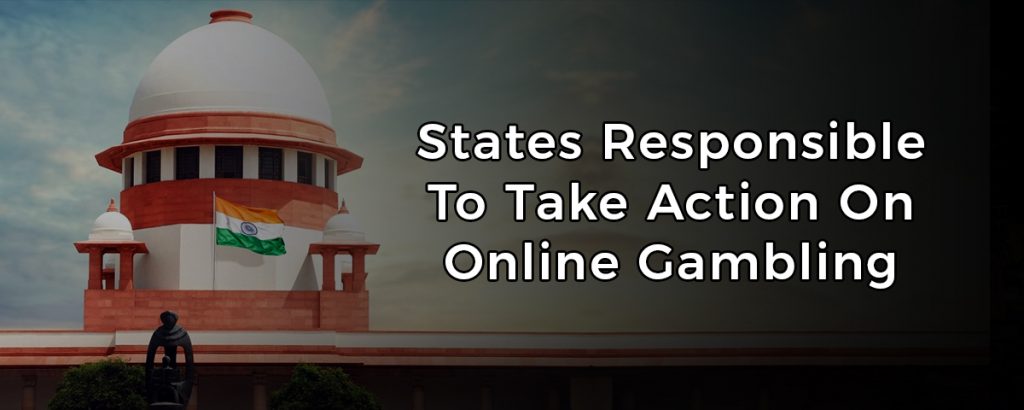States Responsible To Take Action On Online Gambling Websites :Centre to Delhi High Court
The Ministry of Electronics, Information and Technology told the Delhi High Court in an affidavit that issues relating to internet gambling are the responsibility of states, and also some governments have even implemented legislation on the subject.
The affidavit was produced in support of a request to ban online gambling services. It claims that the petitioner has neglected to bring state governments into the case as parties. It further indicates that proper adjudication is impossible without the participation of the respective state governments. The case was postponed until October 11, 2021, by a bench of Justice DN Patel and Justice Jyoti Singh, who noted that the petitioner had not yet been served with a reply copy.
The court, which postponed the case to October 11, stated orally that online gambling is hazardous, and that websites’ profits cannot be made at the expense of children. Despite the fact that several states have passed legislation forbidding such activities, the petition claims that a vast number of websites offering gambling, betting, and wagering games are nonetheless available in India.
States must have proper legislation to prohibit Internet gambling, according to the Bench, in order to assure efficient enforcement. The Delhi High Court had previously sent a notice to the Centre, requesting guidelines and directions on the subject of barring internet gambling from operating in the nation. Avinash Mehrotra, represented by advocates Awantika Manohar, Siddharth Iyer, and Prashant Kumar, filed a PIL seeking directions on how to recover taxes from persons who played gambling games and those who run the website. Aside from that, the plea also asked for a writ of prohibition against the owners and operators of certain online gaming sites.
Gambling is outlawed in the country, according to the law, and many laws prohibit these games as well, according to the report.“It is claimed that, despite the existence of these restrictions, a great number of websites can be accessed in the territory of India, through proper means, and a person is free to gamble with cards or wager on the outcome of sports events, etc,” according to the appeal. The petitioner claimed that the Delhi Public Gambling Act of 1955 makes gambling illegal in the city.
“It is claimed that all of these actions are being carried out despite the fact that they are expressly prohibited by law due to a lack of enforcement of the laws in question. Thus, despite being unlawful in and of themselves, these gambling websites are allowed to exist, driving ordinary people to economic, financial, and social ruin,” the plea stated.
It went on to say that “online gambling is an addictive activity in and of itself, and individuals who are now addicted to it are not in the right frame of mind to take actions to safeguard themselves and the general public from this threat.”
The petitioner has chosen not to make any of the states — Sikkim, Nagaland, Telangana, Andhra Pradesh, or Tamilnadu — parties to legislation that specifically regulates online gaming, according to the Centre, and effective adjudication, in this case, is impossible without hearing the views of these states. It stated that the state government is responsible for taking action against online gambling websites and that MEITY has neither a legislative mandate nor a legal obligation to act against such claimed gaming/gambling-related websites.
“MEITY will not be able to circumvent any laws or legislative mandates in order to prohibit online gaming websites. Furthermore, any action it is anticipated to take to regulate online gambling/gaming websites would create a power struggle with the “proper authority,” which is the state government.”
“All states are anticipated to alter their existing state legislation to govern internet gambling/games (as Sikkim, Nagaland, Telangana, Andhra Pradesh, and Tamil Nadu have done),” according to the report.
The Centre emphasized that governments must ensure that their laws have appropriate regulatory mechanisms to prohibit online gambling in order to ensure effective enforcement. In his appeal, the petitioner, who claims to provide financial consulting services, also alleges that India’s internet gaming industry is uncontrolled and that it is “a wonderful venue for carrying out hawala activities, laundering money, and so on.”
“In reality, it is stated that online gambling companies are likely violating Foreign Exchange regulations, as well as Income Tax laws,” according to the petition. It goes on to say that he filed a similar petition in 2019, which was dismissed with a directive to the Centre to evaluate it as a representation and make a legal judgment.
According to his last plea, he was advised by the central government that it lacked the legislative authority to deal with his request to prohibit or restrict websites. In addition to a ban on these websites, he has demanded tax refunds from individuals who played on them and those who run them. He also wants the Centre to “prosecute the unethical owners/proprietors, and the promoters of online gambling companies in accordance with the law.”

